J.D. Vance pulled a clever stunt on Wednesday.
Not “brilliant,” as some Trump sycophants insist, but effective enough to have left flummoxed liberals whining embarrassingly about sexism and “stalking.”
Vance has been shadowing Kamala Harris as she barnstorms across the Midwest. Yesterday, his plane ended up on the tarmac in Eau Claire, Wisconsin, at the same time as hers. So he strolled over to where the press was staked out, waiting in vain to speak with her, and addressed them.
I thought you guys might be lonely, he told them, seeing as how the vice president no longer takes questions from reporters.
He’s right. According to Politico, Harris hasn’t done an interview since June 27, the night of the worst, most consequential debate performance in American history. Her last proper sitdown interview came three days earlier when she took softball questions from MSNBC on the second anniversary of Roe v. Wade being overturned.
Until yesterday, Harris’ press-dodging since replacing Joe Biden on the Democratic presidential ticket was mostly a hobby horse of right-wing partisans. But Vance’s stunt forced the media to confront it, and his running mate forced the issue further by holding a “General News Conference” at Mar-a-Lago on Thursday.
It’s paying off. “As a journalist and a citizen I think it would be very good for the Democratic ticket to sit for big interviews and routinely answer on the record questions from reporters on the trail,” New York Times columnist Lydia Polgreen tweeted on Wednesday. “It is disappointing that this has not happened yet. But it is not too late to change that!” Semafor’s Benjy Sarlin has also begun watching the clock: “Trump is holding a presser today, we interviewed him last week and Vance yesterday, and Vance is taking open press questions. Time’s just about up on Harris to avoid this becoming a thing.”
Trump and Vance have spent three weeks on their back foot as Harris enjoys the most lavish honeymoon of any party nominee in living memory. They urgently need to regain some control over the race, and throwing her on the defensive by refocusing voters on her refusal to answer questions is a smart way to do so. It pits the press against her, interrupting their lovefest, and it reminds Americans that Democratic presidential candidates have been curiously averse to media scrutiny over the last few cycles. When Vance accused Harris on the tarmac of running her campaign “from a basement with the teleprompter,” he chose his words advisedly.
Is Sarlin correct, then, that it’s time for the vice president to meet the press? As a civic matter, absolutely. Democracy is a sham if the people don’t know what they’re voting for.
But as a strategic matter: Are you out of your mind?
If it ain’t broke, don’t fix it.
Have you seen the polls lately?
Until three weeks ago, Trump had never trailed this year in the RealClearPolitics national average. With Harris atop the ticket, he’s suddenly behind—a swing of nearly 4 points in less than a month. Of the last nine national surveys taken, she leads by 3 or 4 points in more than half of them. That’s in range of the margin she’ll need in the popular vote to stand a solid chance of winning the Electoral College.
In May, the respected Marquette Law School poll found Trump and Biden even nationally at 50 percent apiece. As of Thursday morning the same poll has Harris up 6 points head-to-head and in a multi-candidate field.
Why would she end this spectacularly successful honeymoon a moment sooner than she has to?
As long as she stays away from hard questions and speaks to reporters only off the record, voters are free to project onto her their own policy preferences. Trump can easily defeat a senescent Joe Biden or the pitiful version of Kamala Harris we saw in 2019, but he’s in trouble if she manages to remain disguised as a generic Democrat.
Since the start of Biden’s reelection effort, the left’s theory of victory has been that Trump can’t win if the campaign is “about” him. If Republicans make it into a choice between his record as president and the Biden-Harris record, they’re sitting pretty. But if Democrats turn it into a referendum on whether a coup-plotting loose cannon should be trusted again with power, the GOP is cooked.
I thought Democrats would have trouble running the “referendum” strategy against Trump when Harris replaced Biden as nominee. Surely, with the country thrown for a loop by the eleventh-hour switcheroo, the race would become a referendum on her and whether she’s up to the job. Americans already know what a Trump presidency looks like, after all; most of their energy until November would need to be spent assessing how a Harris presidency might go.
But I was wrong—at least so far. By dodging the press and denying Trump material to attack her with, Harris has left him to his own devices. And … it hasn’t gone great for him, as tends to happen when his enemies get out of his way and let him talk. Every minute Harris is silent is a minute Trump might plausibly spend accusing the popular Republican governor of Georgia of rigging the election against him. Or, as will happen sooner or later, publicly blaming his own running mate for his slide in polling.
He’ll find targets within his own party if he can’t find them on the Democratic side. Why would Harris give him one?
The risk in keeping quiet, of course, is that she’ll allow Trump to define her stances on policy before she’s able to do so herself. Against a disciplined Republican opponent, that would be reckless. But against Trump, who’s “more comfortable with personality-driven attacks rather than issue-driven attacks,” as one Republican pollster delicately put it to the Times, the risk is minimal. This is a guy who’s been handed inflation and immigration on a silver platter as campaign issues yet can’t resist babbling about whether Harris is black or Indian instead.
It’s shaping up on both sides to be the most inane, substance-free presidential campaign in U.S. history. In Detroit on Wednesday, Tim Walz, Harris’ new running mate, said that the one thing he can’t forgive Republicans for is that “they tried to steal the joy from this country.”
“But you know what?” he added. “You know what? Our next president brings the joy! She emanates the joy!”
Voting for a candidate because she “brings the joy” is so idiotic and unserious that it’s hard to believe even an America in steep civic decline would respond to it. But America has. “Bringing the joy” is almost certainly more useful to Harris as a daily message than noodling her way through no-win answers about how to slow inflation or end the war in Gaza or protect Taiwan—or when, precisely, she became aware that Joe Biden was in rapid cognitive decline and resolved to keep her mouth shut about it.
What’s the use?
“We need Kamala Harris to answer tough policy questions in order to know how she’ll govern as president.” That’s the core argument for why she should sit for interviews with the media.
Is it true?
The same right-wing activists who are making that argument today will dismiss Harris’ answers out of hand when (or if) she does speak to the media. No matter how centrist she sounds, they’ll accuse her of lying about her true progressive sympathies for the sake of electability. You can’t trust anything she says!
They might be right. But if you can’t trust anything she says, doing interviews is pointless. Her critics don’t want insight about how she might govern, they want ammunition.
Lay that aside, though, and ask yourself this: For all the talking (and talking and talking) Donald Trump does, how confident are you from the things he says day-to-day that you know how he’ll govern in a second term?
He’s holding a news conference as I write this. How much of your retirement savings would you bet on him honoring any individual policy pledge he makes during it, assuming he discusses policy at all?
Is he a China hawk or a China dove?
Will he commit to NATO or withdraw from the alliance?
Will he veto federal abortion restrictions or sign them into law?
Will he keep his distance from Project 2025 or hand his presidential transition over to its staff?
Even the topics on which he does feel strongly, like immigration, tend to produce proposals that are laughably unworkable. Every position he takes boils down to “Just give me power and I’ll fix everything, with no trade-offs.”
Trump is so fickle and uninformed on policy, and his right-wing coalition so ideologically bifurcated, that one can plausibly imagine his next administration ending up as a more or less traditional Republican presidency (with more tariffs) or a norm-busting authoritarian cartel. His interactions with the press are all but useless in helping us decipher which course he’ll pursue.
I’m not convinced Harris’ interactions with media members will be much more illuminating.
The vice president seems to understand her electoral assignment of pivoting to the center, which is why her spokesmen keep issuing statements rejecting left-wing positions. (The latest one is that she opposes an arms embargo on Israel.) Perhaps putting her on camera and forcing her to reject those positions in her own words would offend some progressives whose votes she needs in November—but I doubt it. The whole point of picking Tim Walz over Josh Shapiro was to purchase the benefit of the doubt from the left.
Meanwhile, centrist voters are likely to receive Harris’ murmurs of moderation more or less skeptically, I suspect, depending on how well disposed toward her they are to begin with. Those who are eager to rationalize voting for her over Trump will talk themselves into believing that she’s an earnest convert. Those who aren’t, won’t. What does she gain by fielding questions at length and risking a major misstep that might alienate the first group?
There’s something vaguely dishonest about demanding that a major-party candidate get into the weeds about policy in a country whose voters long ago gave up caring about policy in a serious way. The paradox of our era of “Flight 93 elections” is that both parties increasingly believe the stakes are existential and yet elections never focus with specificity on policy challenges that truly are existential—the debt crisis, for instance, or how to contain China’s expansion without starting a world war.
The issues treated as “existential” tend to be either esoteric culture-war matters, like whether transgender women should play women’s sports, or tectonic first-order disputes about our system of government, like whether Trump should crown himself Caesar. But big policy debates? We gave those up at some point, possibly when we elected a game-show host president.
In a race between two candidates whose sincerity about their stated policies is inscrutable and rightly in doubt, badgering Harris to do an interview feels like a simulacrum of seriousness. Why keep up the pretense that Americans are committed to making political decisions in an adult manner instead of voting perennially on “vibes”?
The sound of silence.
Cynicism aside, there are good reasons for Harris to start talking to the press.
One, as noted earlier, is accountability to the electorate in a democracy. Just because Americans in 2024 aren’t serious about solving problems doesn’t mean they’ll remain so forever. If you despise Trump for undermining civic norms, you should dislike seeing Harris undermine the one that requires the people’s representatives to explain themselves to their constituents. Not doing so is a bad precedent for the future.
Another is that the longer her silence goes on and the more aware voters become of it, the more it’ll overshadow her campaign and turn this race into a referendum on her, not Trump.
Joe Biden’s team treated public anxiety about his age by doggedly ignoring it—until they couldn’t. Trying to pull the same trick with respect to Harris’ ambiguity on policy could end the same way for her. The longer her media boycott goes on, the more suspicious Americans will become that it says something meaningful about her competence, or her own lack of confidence in it.
And they should be suspicious. She’s not great at the whole “talking” thing, you know.
Silence is an especially bad look for her given the dubious way Democrats chose their nominee this year. The president and his inner circle conspired to hide his decline from primary voters, presumably with the participation of Kamala Harris, and now Harris is going to turn around and hide her policy positions from general election voters?
If those voters aren’t angry at her yet for persistently concealing information from them, they should be—and will be, I think. They’re justified in believing that a candidate who, uniquely in modern history, won her party’s nomination without having to explain herself during a primary has a heightened duty to explain herself now.
One more thing. Although Trump is probably too undisciplined (I mean, really) to define Harris on policy if she clams up and doesn’t define herself, his war chest can buy an awful lot of ads showcasing her far-left positions circa 2019. Forcing Americans to choose between the devil they know and the devil they don’t on Election Day probably won’t work out for her. She’s going to have to show her cards at some point—at the debate on September 10, which is now on, for starters—so she might as well start doing it in more comfortable environments.
If I were advising her campaign, I’d have her and Tim Walz sit for a friendly interview with someone like Rachel Maddow before the Democratic convention later this month. That way she’ll have “checked the box” of facing the media, sort of, and if things go badly she’ll have a euphoric reception at the convention ahead of her to help erase the public’s memory of it. If nothing else, it’ll break the humiliating habit she’s formed of announcing major policy stances via tweets by her deputies.
According to Politico, a joint interview before the convention is indeed in the works, although it’s not clear yet with whom. It might be with local media. “The voters that she needs are at the local level,” one ally told the site. “They’re not reading the national press.”
I’d also advise her to keep hitting Trump for his conspicuously light campaign schedule. Political junkies, not all of them liberals, have noticed that 40-year-old J.D. Vance is holding many more events lately than his 78-year-old patron. That’s been a habit for Trump for months, in fact: Supposedly the end of his criminal trial in Manhattan was going to free him up to hit the trail in earnest, but no dice so far.
Trump isn’t as vulnerable as Biden was to the charge that he’s too old to do the job, but he’s obviously far more vulnerable than Harris. And the Biden saga must have left voters sensitive to that vulnerability even with the president off the ticket. If you were alarmed by Biden’s debate performance on June 27, as practically everyone was, it’s all too easy to imagine how Trump might look and sound when he’s the president’s age in three years.
If declining to do interviews is evidence that a candidate is keen to hide her incompetence, so is declining to match an opponent’s campaign schedule. I doubt Harris can satisfy voters’ appetite for information about her positions purely through rallies, but the more often she’s on television relative to a missing-in-action Trump, the easier it’ll be for voters to discount accusations that she’s “hiding.”
The Trump era in American politics could end with him being too “low energy” to regularly put himself in front of adoring crowds. Imagine.
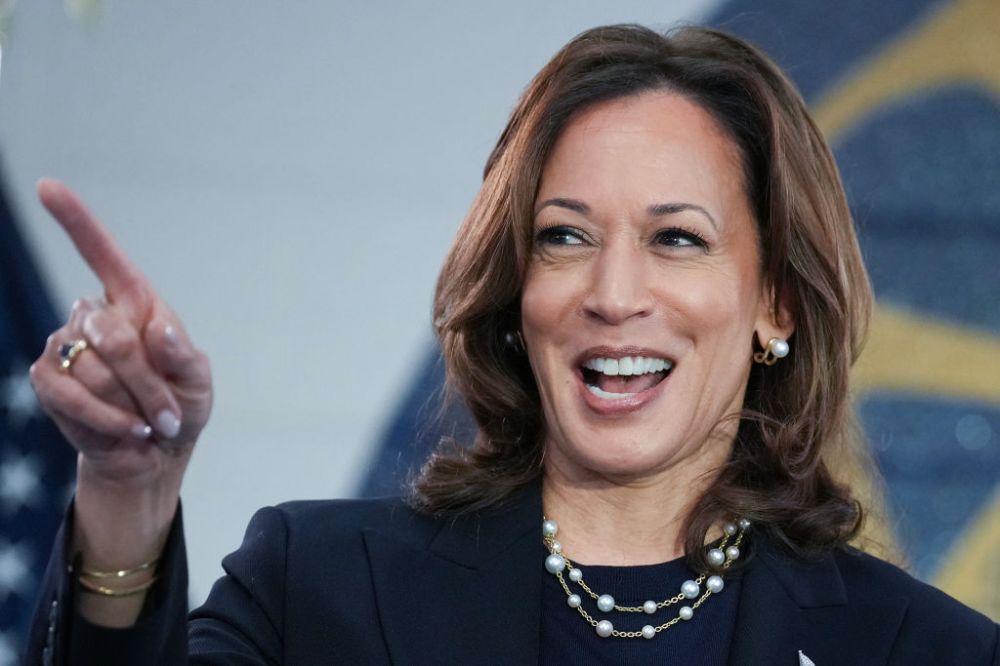

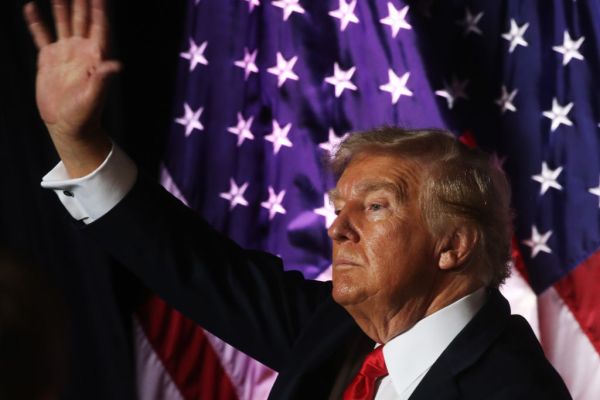
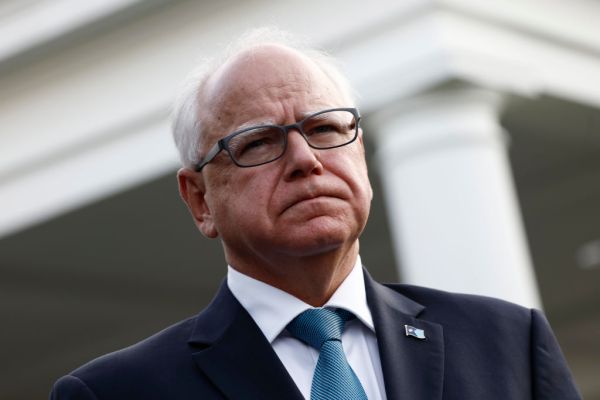
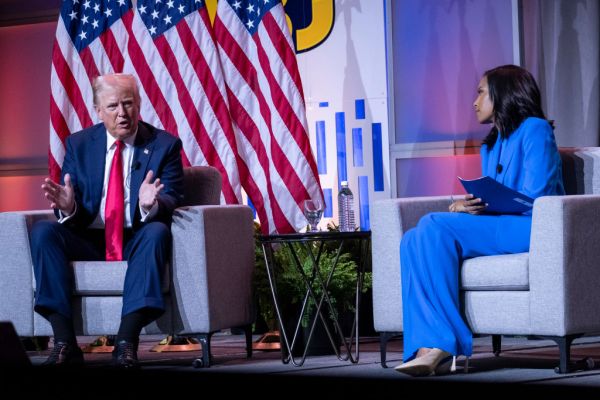
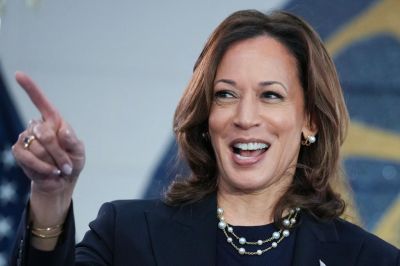
Please note that we at The Dispatch hold ourselves, our work, and our commenters to a higher standard than other places on the internet. We welcome comments that foster genuine debate or discussion—including comments critical of us or our work—but responses that include ad hominem attacks on fellow Dispatch members or are intended to stoke fear and anger may be moderated.
With your membership, you only have the ability to comment on The Morning Dispatch articles. Consider upgrading to join the conversation everywhere.